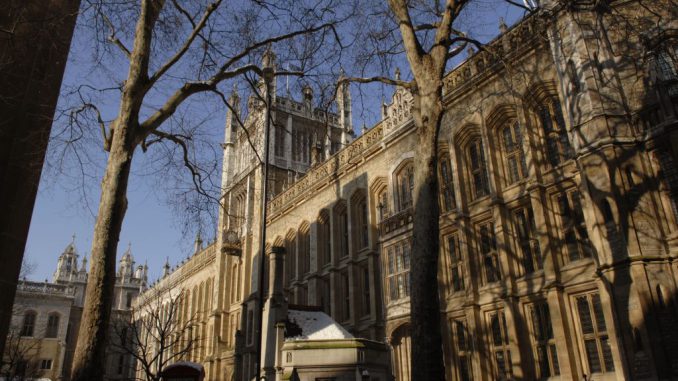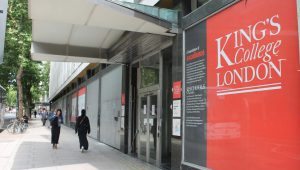
Doing a PhD in Arts & Humanities at King’s is not at all how I expected it would be. From my master’s at a different university, I got the impression that I would be spending my days in the corner of libraries with no one to talk to, staring at books and feeling swamped by the project ahead. It turns out that the PhD students in the Virginia Woolf Building – part of the King’s Strand Campus on Kingsway that houses a number of A&H departments – have their own offices: glass-walled rooms on each floor of the building that we lovingly refer to as the ‘fishbowl’. The offices are in the middle of each floor, so you always bump into people and feel involved in the life of the department. Doctoral students and academic staff regularly come together for research seminars and book launches, both of which usually involve wine, and the research environment this creates is great. I feel able to ask any more senior member of staff for advice and love my fishbowl family of fellow doctoral students who make PhD life at King’s so good. I could never have hoped for such a strong community of scholars and friends in which to conduct my research.

Many PhD students come into the office every day (even if we all arrive after 10am…), which means that a PhD at KCL is much like doing a normal office job, but with more like-minded people and a lot more flexibility. This structure is really important when doing an independent research project because it reminds you that your work is part of something bigger and helps to confirm the value of your own research. The collective workspace also encourages collaboration between students, both informally through book recommendations or daily conversations, and in a more structured way in the co-organisation of conferences and seminars, or the offer of many good pairs of eyes to proof-read your thesis when you finally finish it.
As a doctoral student at KCL, you also have to opportunity to teach undergraduates and gain experience leading seminars in a HE context. This work too is very rewarding; it’s a relief to remember that you do actually understand the ideas you’re struggling within your own research when you have to communicate them clearly to others! Teaching also spans all departments, so students in French can apply to teach in CMCI, Film Studies, English, and more, as well as in their home department. We are also encouraged to shadow other staff members to see how they teach and are observed in turn to help us improve our own teaching practice. PhD students in French also have the opportunity to audit (sit in on) seminars that run as part of the MA courses in their department; always useful to revisit some of the more difficult theoretical texts and glean some ideas for your own research.
The other advantages of studying in London have been expressed elsewhere on this blog, but my strongest point in favour of doing a PhD at KCL is the community. There is a belief that PhDs can be lonely and hard, and this is can be the case. Being surrounded by fellow researchers and offered plenty of opportunities to participate in the department however means that a PhD can also be a cracking way to spend 3-4 years researching what you love and having a good time in the process.
Read More
Click here to read Ejemen’s experience of studying a PhD at King’s College London.

Leave a Reply